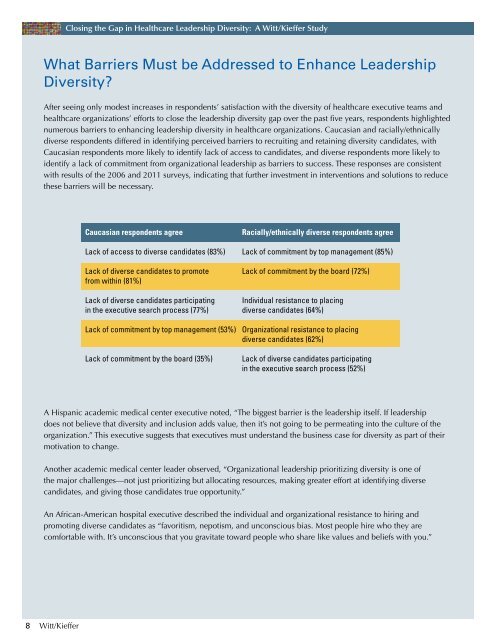Closing the Gap in Healthcare Leadership Diversity A Witt/Kieffer Study
WEVWd
WEVWd
You also want an ePaper? Increase the reach of your titles
YUMPU automatically turns print PDFs into web optimized ePapers that Google loves.
<strong>Clos<strong>in</strong>g</strong> <strong>the</strong> <strong>Gap</strong> <strong>in</strong> <strong>Healthcare</strong> <strong>Leadership</strong> <strong>Diversity</strong>: A <strong>Witt</strong>/<strong>Kieffer</strong> <strong>Study</strong><br />
What Barriers Must be Addressed to Enhance <strong>Leadership</strong><br />
<strong>Diversity</strong>?<br />
After see<strong>in</strong>g only modest <strong>in</strong>creases <strong>in</strong> respondents’ satisfaction with <strong>the</strong> diversity of healthcare executive teams and<br />
healthcare organizations’ efforts to close <strong>the</strong> leadership diversity gap over <strong>the</strong> past five years, respondents highlighted<br />
numerous barriers to enhanc<strong>in</strong>g leadership diversity <strong>in</strong> healthcare organizations. Caucasian and racially/ethnically<br />
diverse respondents differed <strong>in</strong> identify<strong>in</strong>g perceived barriers to recruit<strong>in</strong>g and reta<strong>in</strong><strong>in</strong>g diversity candidates, with<br />
Caucasian respondents more likely to identify lack of access to candidates, and diverse respondents more likely to<br />
identify a lack of commitment from organizational leadership as barriers to success. These responses are consistent<br />
with results of <strong>the</strong> 2006 and 2011 surveys, <strong>in</strong>dicat<strong>in</strong>g that fur<strong>the</strong>r <strong>in</strong>vestment <strong>in</strong> <strong>in</strong>terventions and solutions to reduce<br />
<strong>the</strong>se barriers will be necessary.<br />
Caucasian respondents agree<br />
Racially/ethnically diverse respondents agree<br />
Lack of access to diverse candidates (83%) Lack of commitment by top management (85%)<br />
Lack of diverse candidates to promote Lack of commitment by <strong>the</strong> board (72%)<br />
from with<strong>in</strong> (81%)<br />
Lack of diverse candidates participat<strong>in</strong>g Individual resistance to plac<strong>in</strong>g<br />
<strong>in</strong> <strong>the</strong> executive search process (77%) diverse candidates (64%)<br />
Lack of commitment by top management (53%) Organizational resistance to plac<strong>in</strong>g<br />
diverse candidates (62%)<br />
Lack of commitment by <strong>the</strong> board (35%)<br />
Lack of diverse candidates participat<strong>in</strong>g<br />
<strong>in</strong> <strong>the</strong> executive search process (52%)<br />
A Hispanic academic medical center executive noted, “The biggest barrier is <strong>the</strong> leadership itself. If leadership<br />
does not believe that diversity and <strong>in</strong>clusion adds value, <strong>the</strong>n it’s not go<strong>in</strong>g to be permeat<strong>in</strong>g <strong>in</strong>to <strong>the</strong> culture of <strong>the</strong><br />
organization.” This executive suggests that executives must understand <strong>the</strong> bus<strong>in</strong>ess case for diversity as part of <strong>the</strong>ir<br />
motivation to change.<br />
Ano<strong>the</strong>r academic medical center leader observed, “Organizational leadership prioritiz<strong>in</strong>g diversity is one of<br />
<strong>the</strong> major challenges—not just prioritiz<strong>in</strong>g but allocat<strong>in</strong>g resources, mak<strong>in</strong>g greater effort at identify<strong>in</strong>g diverse<br />
candidates, and giv<strong>in</strong>g those candidates true opportunity.”<br />
An African-American hospital executive described <strong>the</strong> <strong>in</strong>dividual and organizational resistance to hir<strong>in</strong>g and<br />
promot<strong>in</strong>g diverse candidates as “favoritism, nepotism, and unconscious bias. Most people hire who <strong>the</strong>y are<br />
comfortable with. It’s unconscious that you gravitate toward people who share like values and beliefs with you.”<br />
8<br />
<strong>Witt</strong>/<strong>Kieffer</strong>



